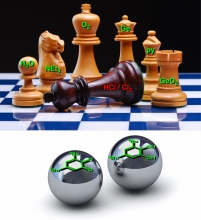Cellulose, one of the three major components of plants, is showing great promise as a renewable source for many convenience products. It is made of glucose, a molecule which can be fermented by microorganisms into virtually any desired small molecule of interest. More especially it can be converted to ethanol to make sustainable biofuels.

Mechanochemical method makes noble metal compounds without solvents or harsh reagents. Read more in Chemical & Engineering News, the magazine of the American Chemical Society.

Mechanochemical method developed by Tomislav Friščić and team makes noble metal compounds without solvents or harsh reagents


The Natural Sciences and Engineering Research Council of Canada has awarded an E.W.R Steacie Memorial Fellowship to Prof. Tomislav Friščić, to support his work in an innovative branch of chemistry that aims to develop environmentally friendly alternatives to solvent-based chemical processes.
NSERC awards up to six of these two-year, $250,000 fellowships annually to enhance the career development of outstanding and highly promising scientists and engineers.
The solvent-free mechanochemical synthesis of a metal-organic framework, ZIF-8, was followed in real-time by in situ X-ray diffraction monitoring. The movie can be seen here.

The research group of Prof. Tomislav Friščić in McGill’s Department of Chemistry has made a name for itself in the little-known, but growing field of “mechanochemistry,” in which chemical transformations are produced by milling, grinding or shearing solid-state ingredients – brute force, in other words, rather than fancy liquid agents. “Your coffee maker grinds things,” and grinding molecules in the lab involves much the same principle, Friščić notes. Using mechanical force also has the significant advantage of avoiding the use of environmentally harmful bulk solvents.

